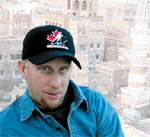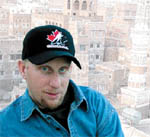
A Canadian in Yemen: Restoring dignity in Palestine [Archives:2002/19/Culture]
May 6 2002
Thomas Froese

Looking at the furnace of politics in the Middle East, is doesnt appear the dusty prophecy is around the corner. Yemen in particular has been seeking to help Palestine. Plenty of demonstrations in recent weeks here in Sanaa have shown how much Yemeni hearts are with their Arab brothers.
The topic came up while I recently broke bread with some Arab friends, in particular with a Palestinian visiting from Jordan. My conversation with Ahmed, a 47-year-old pharmacist exiled in Jordan since 1973, reminded me that Palestinians have known the type of grief which some of us can only imagine.
Forced from home
In 1948, his family, along with thousands of others, was forced from their home to make way for newcomers, in this case Jews from Iraq. What if that happened to you, lets say, at gunpoint? No questions. Just pack your memories, and dont come back.
Ahmed was born and grew up in Nablus, among the Palestinian cities recently under Israeli attack. Even now, living with two million Palestinians in Jordan, he says he longs for the old family-home in Haifa, and believes he will return in shaa llah.
The only solution now is military action, he concludes. That seems strange coming from such a gentle spirit, but considering whats happened, its not surprising.
International sympathy after the Holocaust, plus views on religious prophecy, are reasons some support Jews having their ancestral home.
But Jesus and Moses, in the words of Ahmed, have little to do with his family being thrown out of their home. And even a cursory study of the political intrigue and double-dealing involved in the 50 years prior to 1948 shows the so-called modern miracle of Israel is rife with problems.
A unique calling
I suspect, if anything then, Israel has a unique calling to care for the Holy Land, side- by-side with a healthy Palestine. Certainly the God used to justify Israels actions also wants justice for Palestinians, particularly since they have an ancient promise through the same bloodline as the Jews.
In his book Blood Brothers, Elias Chacour, a Palestinian scholar and minister, poignantly puts his finger on this, and suggests a demon of militarism has infected modern Israel. He chafes at the long-time silence of the international community while his people live as orphans at home and lepers abroad.
A different response
Palestinians have typically responded in two ways. One is quiet resignation. The other, armed uprising. But, Chacour, whose parents actually put him in an orphanage so he could receive a good education in Haifa, shows a third way.
After studies in Europe he returned home, and with volunteers from Germany and Holland, he built community centers, schools and libraries in Galilee. Peace centers were inaugurated with The Diary of Anne Frank, to show Anne could easily be a modern Palestinian girl. By the early 80s, within three years of launching youth camps, 4,000 kids benefited. Jews and Palestinians were brought together for dialogue, and Palestinian dignity was restored.
Chaucor continues that type of work even now, in the spirit of brotherhood.
Why havent others been able to do the same over the last 50 years? My friend Ahmed says because political violence has brought crippling fear to those who can help. So it seems more clear than ever that building a new Middle East will need a different approach. It will take time, and it will take soul-searching by this generation.
Binding people together
I think of Chacours father who, at gunpoint, was forced off his homestead in Birma, a Palestinian village later destroyed by Zionists. Years later, he still walked past its charred remains to tend his old fig trees, and eventually grafted several varieties together. Each wrapped around the other into one: a powerful symbol of different people bound together.
Thats the mystery of peace achieved in some modern movements. Think of Ghandhi in India, and Martin Luther King Jr. in America. They brought liberty to their races by grafting people groups together, not force.
That doesnt mean all will be tranquil. These men were martyred for blessing their enemies. But they understood that sometime peace can only be experienced even when one is in the eye of the storm. Thats what eventually changes both hearts and institutions.
Thats the deep need in this region. Without that type of vision, Im afraid that plans for long-term peace will continue to flounder. And others will get dragged into the oven.
Thomas Froese (140765@sympatico.ca)
is an editor with the Yemen Times.
——
[archive-e:19-v:2002-y:2002-d:2002-05-06-p:./2002/iss19/culture.htm]


